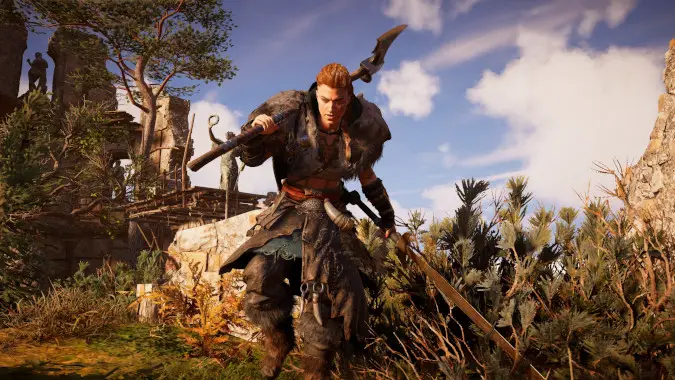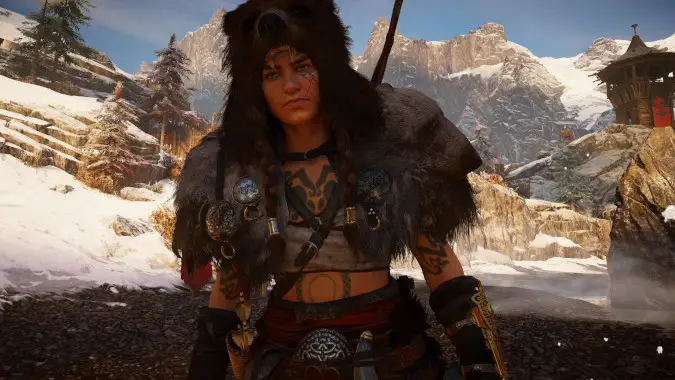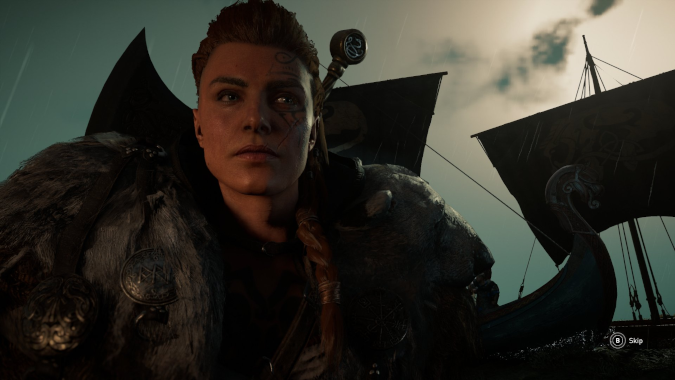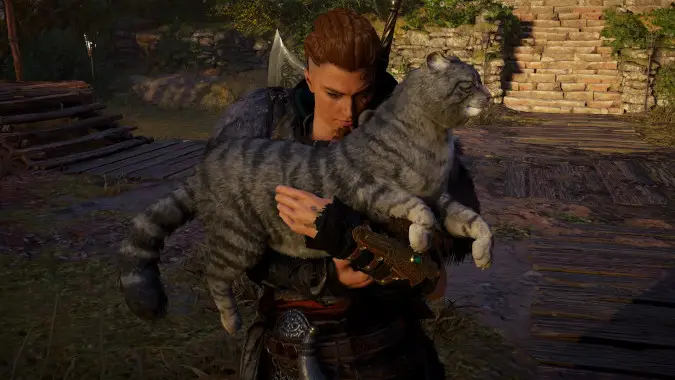Assassin’s Creed Valhalla displays the evolution of a franchise into a complex, but classic, RPG

Just for a sense of the scale of Ubisoft’s latest Assassin’s Creed game, Assassin’s Creed Valhalla, I am just now probably at the 1/3rd mark. This is after a lot of time spent playing the game — easily thirty or more consecutive hours, if not more. And so, while I will give you my opinion on the game so far, this is not a review — I am not here to tell you whether or not the game is good, so much as I am here to discuss what the game reveals about the franchise, the direction it’s moving in, and how somehow Ubisoft quietly became the most amusing, perplexing and challenging developer of full fledged role playing games on the market.
In a way, there’s a great deal of creative tension in the current iteration of the Assassin’s Creed franchise, as Valhalla tries to balance the long time fans of its venerable franchise — players who started playing with the original game or its more famous sequel, who know Altaïr or Ezio better than any of these new people, who played and liked the games when they were stealth driven sneak em ups.
It’s a far cry from the days of getting desynchronized because you were a bit too public with your actions to Valhalla, where you’re spearheading a group of Viking raiders out to claim a parcel of England to rule for themselves in the year 874 AD. Trying to give players who’ve been with the franchise since the beginning the things they want most — Hidden Blades, the Assassins as an order, Templars — while also giving the new direction set during Assassin’s Creed Origins a fair chance has to be challenging.

How Ubisoft reinvented Assassin’s Creed
I’ve liked each game in the series since Origins, and I think Ubisoft was pretty tentative with its RPG elements in that game — it wasn’t until Odyssey that they really went in on the RPG aspects of the franchise, going so far as to let players pick between a male and a female protagonist. In many ways, Odyssey became not just one of my favorite games in the series by embracing the RPG sandbox aspect of the game, they did so in a manner that challenged games like Horizon Zero Dawn and even the venerable Witcher 3 — both in terms of the huge, sprawling world open for the player to explore but with the creation of a likeable protagonist to explore said world in, Kassandra was a revelation, and even two years later, I still miss getting to see what she gets up to.
In many ways, it was Odyssey that was the best Bioware-style RPG of the past five years, if not the past ten years. There have been a lot of RPG’s I’ve liked in that time, and several I’ve loved — if I was making a list, games like Mass Effect 2, Kingdoms of Amalur, and Horizon Zero Dawn would absolutely be on that list of games, big sandboxy games with strong narrative flair. Odyssey was definitely a contender on that list, and for myself personally, pretty dang close to the top of it. And since I loved that game so much, it kind of got into the way of my enjoyment of Valhalla. Because to be completely honest, the first five hours, I was constantly comparing the two games and in many ways Odyssey was winning the comparison.
But the two games are a different kind of narrative, told in different ways, each playing a different riff on the same basic idea. If Origins was saying, “hey, what if we did a different kind of Assassin’s Creed,” and Odyssey was saying, “what if we made a full on RPG in the setting,” then Valhalla is saying “well, if we did that, we could use it to tell a story with actual moral ambiguity for once,” and it’s fascinating.
Eivor is not Kassandra, or Bayek, or Altair, or Ezio — they’re a character with a strong, strictly defined code that is not the kind of morality we’re used to, nor is it the demented I’m eeeeevil flouting of norms which often leads to puppy kicking bad for bad’s sake. This is an authentic, genuine pagan from the 9th century who has come to England with conquest in mind, and you can decide for yourself what that means. Without spoiling the game, I’ve seen Eivor given the option to lift people up, or tear them down, and both options made sense and felt realized.

The narrative has only grown more complex
There is a complexity to the narrative in this game that even Odyssey didn’t manage. Eivor starts out wanting revenge for the deaths of their parents, but then gets that revenge — so the rest of the game, or at least the amount I’ve gotten to play, is more about loyalty. Loyalty to your friend and foster brother, loyalty to the clan of people who took you in when your family died, loyalty to yourself and your own sense of honor and glory. Seeing a character mock Christians and Christianity while burning and pillaging monasteries for loot used to build up a settlement is not a familiar experience, and you never get the sense that Eivor or her clan are monsters but they are invaders, come to England rather than accepting the rule of a single kingdom in a unified Norway.
Again, you play as a character who burns monasteries. And it’s one of the most fun gameplay elements in the entire game, to the point where you’ll be on the lookout for new monasteries to set aflame and new treasures to bring home to the settlement.
Now, this is still an Assassin’s Creed game, and it’s one that embraces the mythology of the setting more so than either of its direct predecessors. Unlike Origins, this is set some 900 years after the founding of the Hidden Ones and so, most of the trappings of the Assassin Order are in place, complete with Hidden Blades on their wrists and everything. Both Origins and Odyssey avoided a lot of that by being set during or before the formation of the Assassins, and even the major antagonists for Odyssey weren’t the Templars or their direct ancestors the Order of the Ancients, but rather the Cult of Kosmos, a similar group who were somewhat different in their ultimate goals, but very similar in terms of effect. Valhalla is probably the most old-school AC game of the current generation, making an effort to bring the stealth assassination gameplay playstyle fully back into the game for players who want to play that way.
So when I say that Valhalla may have the most moral ambiguity of any of the modern AC games, I’m not saying it’s abandoned the premise of Assassins good, Templars bad — or at least Assassins as pro-free will, Templars as proto-fascists. What I’m saying is that this is the first Assassin’s Creed game that really seems to examine some of the permutations of that — that untrammeled free will can often lead to some really sketchy behavior, that every woman and man will always live trying to balance between freedom and security. What would you do to protect the people you love? To maintain your own sense of self?

The game is ambitious in its scope, and how meta it all gets
The Assassin’s Creed games have been getting further and further into the concept of reality as a simulation, and it was very noticeable in all three of the newer games, with Origins sending you to the land of the dead, Odyssey taking you on a tour of Elysium, Hades, and Atlantis, and Valhalla letting your player get downright meta about the whole thing. At one point it hit me that I was playing a video game where Layla Hassan, an Assassin, is in a virtual reality simulation of the past memories of Eivor, a Norwegian raider, who at one point gets super high and relives the past memories of Odin, the king of the Aesir. It’s like a Turducken of simulated reality. I, Matt Rossi, am playing a character playing someone else who, during the simulation of that third person, starts playing as a fourth person.
I’m still not sure I like Valhalla better than Odyssey. I really loved Kassandra and while Eivor has grown on me a lot, I don’t feel the same way about her. But I think Valhalla might actually be the most intricate, ambitious, and daring Assassin’s Creed game ever made, that it takes narrative risks and chances the others did not, that it brings pretty much everything you’d expect from a modern open world RPG — romance options, dialogue choices, a ton of content in a sprawling world to explore, fighting King Lear’s three daughters because of course you do — and it does all of that while still trying to pay homage to the games that got them this far. This is the series at its most assured, its most comfortable in its current format, its most inventive and daring. This is a game which will take you on a bizarre psychedelic nightmare one moment, an epic Game of Thrones-flavored quest to install a King on the throne of East Anglia the next, and make you cry over a bear.
It is a terrifying achievement, and if you miss games like Mass Effect or Dragon Age, you should absolutely play Assassin’s Creed Valhalla. Ubisoft somehow, in 2020, have a franchise of three of the best CRPGs on the market, and this one is the most accomplished, creative and outright lunatic of the three. This feels like Ubisoft is finally comfortable saying Yes, we make RPGs now. I mean, it has Titan’s Grip. It knows what it is, at last.
Please consider supporting our Patreon!
Join the Discussion
Blizzard Watch is a safe space for all readers. By leaving comments on this site you agree to follow our commenting and community guidelines.
 @MatthewWRossi
@MatthewWRossi




